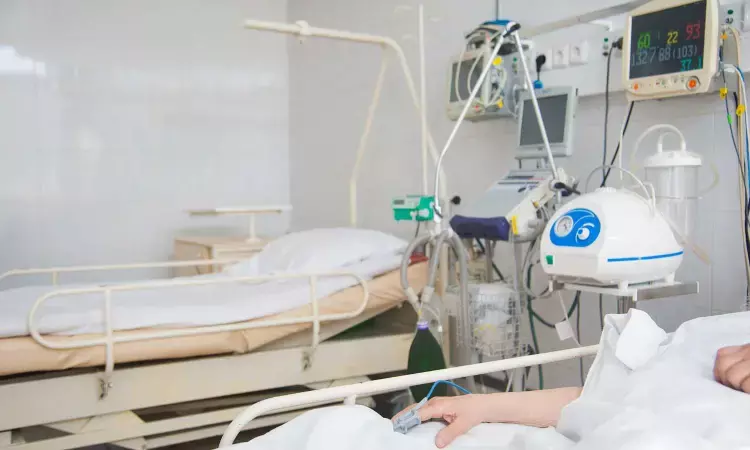- Home
- Medical news & Guidelines
- Anesthesiology
- Cardiology and CTVS
- Critical Care
- Dentistry
- Dermatology
- Diabetes and Endocrinology
- ENT
- Gastroenterology
- Medicine
- Nephrology
- Neurology
- Obstretics-Gynaecology
- Oncology
- Ophthalmology
- Orthopaedics
- Pediatrics-Neonatology
- Psychiatry
- Pulmonology
- Radiology
- Surgery
- Urology
- Laboratory Medicine
- Diet
- Nursing
- Paramedical
- Physiotherapy
- Health news
- Fact Check
- Bone Health Fact Check
- Brain Health Fact Check
- Cancer Related Fact Check
- Child Care Fact Check
- Dental and oral health fact check
- Diabetes and metabolic health fact check
- Diet and Nutrition Fact Check
- Eye and ENT Care Fact Check
- Fitness fact check
- Gut health fact check
- Heart health fact check
- Kidney health fact check
- Medical education fact check
- Men's health fact check
- Respiratory fact check
- Skin and hair care fact check
- Vaccine and Immunization fact check
- Women's health fact check
- AYUSH
- State News
- Andaman and Nicobar Islands
- Andhra Pradesh
- Arunachal Pradesh
- Assam
- Bihar
- Chandigarh
- Chattisgarh
- Dadra and Nagar Haveli
- Daman and Diu
- Delhi
- Goa
- Gujarat
- Haryana
- Himachal Pradesh
- Jammu & Kashmir
- Jharkhand
- Karnataka
- Kerala
- Ladakh
- Lakshadweep
- Madhya Pradesh
- Maharashtra
- Manipur
- Meghalaya
- Mizoram
- Nagaland
- Odisha
- Puducherry
- Punjab
- Rajasthan
- Sikkim
- Tamil Nadu
- Telangana
- Tripura
- Uttar Pradesh
- Uttrakhand
- West Bengal
- Medical Education
- Industry
Healthy microbiome could prevent severe infections in ICU

Canada: A recent study published in Nature Medicine found that patients who experienced an abnormal increase in the growth of this common bacteria called a bloom during their stay in the ICU (intensive care unit) were at the highest risk of severe infections.
Twenty to 50 per cent of all critically ill patients contract potentially deadly infections during their stay in the intensive care unit or the hospital after being in the ICU-markedly increasing the risk of death.
“Despite the use of antibiotics, hospital-acquired infections are a major clinical problem that persists to be a huge issue for which we don’t have good solutions,” says Dr. Braedon McDonald, MD, PhD, an intensive care physician at the Foothills Medical Centre (FMC) and assistant professor at the Cumming School of Medicine (CSM). “We tackled this issue from a different angle. We looked at the body’s natural defence to infection to better understand why some people are more susceptible to these deadly infections.”
The study involved 51 patients newly admitted to FMC's intensive care unit (ICU). Patients were studied over the first week of acute critical illness. The research showed that the gut microbiota and systemic immunity work together as a dynamic “metasystem,” in which problems with gut microbes and immune system dysfunction are associated with significantly increased rates of hospital-acquired infections.
“The signal that we’ve seen in our research is that a family of bacteria that naturally live in the gut seems important for directing the immune system,” says Jared Schlechte, PhD candidate in McDonald’s lab and first author of the study. “However, during critical illness, the microbiome becomes injured, allowing these bacteria to start taking over.”
“This information is important because it gives us a whole new avenue to start thinking about not just ways to treat infections, but a potential treatment to prevent them,” says McDonald. “The findings suggest that if we want to fight infection, we can’t just target these bad bacteria in isolation and the immune system in isolation. We really need to have a more holistic view of how things are functioning.” McDonald says the study’s findings
As a next step, McDonald and the team plan to launch a randomized, controlled clinical trial based on a precision medicine approach that borrows from probiotics therapy and utilizes multiple different bacteria engineered to target the bacteria identified in the study specifically. People who agree to participate will be given engineered microbiomes.
“What we’re trying to do is restore the normal mechanism that works when we’re healthy and take advantage of that to help protect people from infections,” McDonald says.
Reference:
Schlechte, J., Zucoloto, A.Z., Yu, Il. et al. Dysbiosis of a microbiota–immune metasystem in critical illness is associated with nosocomial infections. Nat Med (2023). https://doi.org/10.1038/s41591-023-02243-5.
Dr Kamal Kant Kohli-MBBS, DTCD- a chest specialist with more than 30 years of practice and a flair for writing clinical articles, Dr Kamal Kant Kohli joined Medical Dialogues as a Chief Editor of Medical News. Besides writing articles, as an editor, he proofreads and verifies all the medical content published on Medical Dialogues including those coming from journals, studies,medical conferences,guidelines etc. Email: drkohli@medicaldialogues.in. Contact no. 011-43720751


